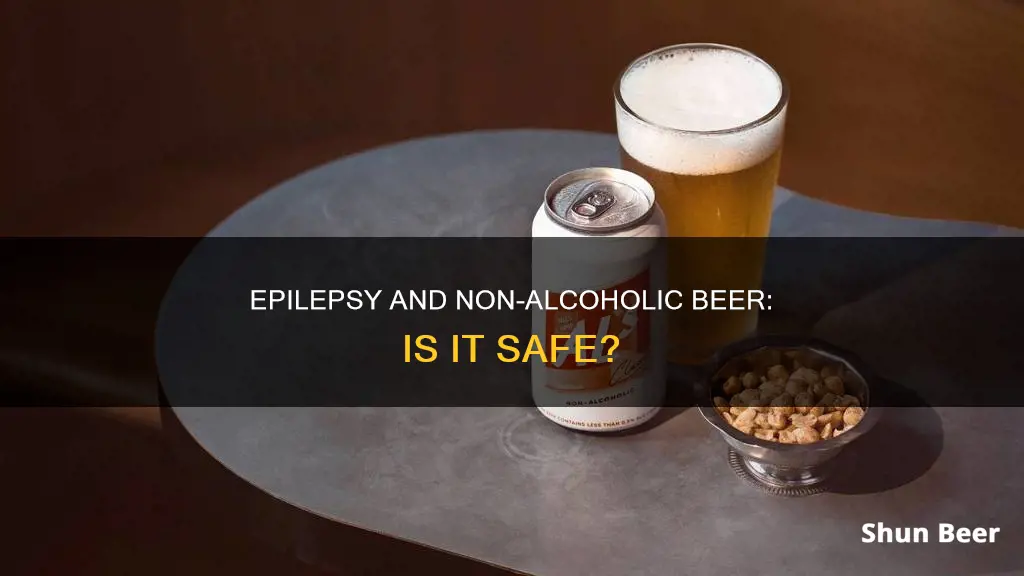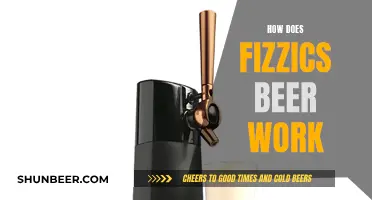
Drinking alcohol is a personal choice, but it is important to know how it can affect your epilepsy. Alcohol can cause seizures in some people, and it can also interact with anti-epileptic drugs, increasing the risk of a seizure or causing other health issues. So, what about non-alcoholic beer? Can this be a safe alternative for people with epilepsy? Non-alcoholic beer typically contains a negligible amount of alcohol, usually less than 0.5% ABV. This means that it is unlikely to have the same effects on the body as regular alcoholic beverages. However, it's important to note that even small amounts of alcohol can affect individuals with epilepsy, and the risk may vary from person to person. Therefore, it is always advisable for people with epilepsy to consult their doctor or specialist before consuming any amount of alcohol, including that found in non-alcoholic beverages, to ensure they are making an informed decision about their health.
| Characteristics | Values |
|---|---|
| Can epileptics drink non-alcoholic beer? | There is no evidence that non-alcoholic beer will have any negative impact on epilepsy. However, it is important to note that non-alcoholic beer may still contain a small amount of alcohol, and the effects of alcohol on epilepsy vary from person to person. |
| Alcohol as a seizure trigger | In small amounts, alcohol does not typically cause seizures. However, binge drinking and alcohol withdrawal can increase the risk of seizures and even lead to status epilepticus, a potentially fatal condition. |
| Alcohol and epilepsy medication | Alcohol can increase the side effects of epilepsy medication, such as drowsiness and dizziness. Additionally, alcohol may reduce the effectiveness of epilepsy medication by lowering the amount of medication in the body. |
| Alcohol and sleep | Alcohol can disrupt sleep, and tiredness is a common trigger for seizures. |
| Recommendations | It is generally recommended that people with epilepsy avoid alcohol completely or drink in moderation. People with epilepsy should also be cautious when driving, as alcohol and epilepsy medication can affect coordination and awareness. |
What You'll Learn

Alcohol withdrawal can cause seizures
Abruptly stopping alcohol intake after prolonged heavy drinking can trigger alcohol withdrawal seizures. Generalized tonic-clonic seizures are the most common and severe type of seizure that occurs in this setting. Tonic-clonic seizures, previously known as "grand mal", are characterized by a tonic phase, where the body's muscles stiffen, and the person loses consciousness, followed by a clonic phase, where the arms and legs jerk rapidly and rhythmically. These seizures usually occur within 48 hours of the last drink but can happen at any time during the first week of withdrawal.
Alcohol withdrawal seizures occur due to the sudden cessation of alcohol intake in individuals who have developed physical alcohol dependence. When someone regularly consumes large amounts of alcohol, their brain chemistry adapts to the depressant effects of alcohol, including changes in neurotransmitter levels such as gamma-aminobutyric acid (GABA) and glutamate, which help regulate brain activity. When alcohol consumption is stopped abruptly, the brain's chemistry is disrupted, leading to an overexcitation of the nervous system as the brain continues to produce higher levels of excitatory neurotransmitters. This hyperactivity can result in seizures, which are sudden, uncontrolled electrical disturbances in the brain.
Research has shown that the severity of alcohol withdrawal symptoms increases over years of alcohol abuse. Repeated detoxifications and relapses, known as the "kindling effect", increase the likelihood of alcohol withdrawal seizures. This is because each withdrawal incident acts as an irritation to the brain, and the accumulation of these incidents lowers the threshold for seizures.
It is important to note that not everyone who experiences an alcohol withdrawal seizure will go on to develop epilepsy, which is characterized by two or more unprovoked seizures. However, there is evidence that alcoholism could cause long-term epilepsy. Studies suggest that repeated episodes of binge drinking and withdrawal gradually cause permanent changes in the brain, increasing the likelihood of seizures in the future, even if the person stops drinking alcohol completely.
If you think you may be alcohol-dependent and want to stop drinking, it is crucial to seek medical advice to reduce the risk of seizures and other dangerous symptoms of alcohol withdrawal. Detoxification and withdrawal are best managed with the help of medical professionals, especially if you have a severe or long-term addiction.
Jaundice Recovery: Is Beer a Friend or Foe?
You may want to see also

Alcohol can interact with anti-seizure medication
For instance, certain anti-seizure medications, such as benzodiazepines, phenobarbital, clonazepam (Klonopin), lorazepam, and diazepam (Valium), are known to have serious interactions with alcohol. Mixing these medications with alcohol can lead to dangerous central nervous system depressant effects, including slowed breathing and heart rate, and memory impairment.
Furthermore, alcohol can also increase the risk of liver problems when combined with specific anti-seizure medications like Keppra. Meanwhile, lamotrigine, when mixed with alcohol, may cause increased sleepiness. Anti-seizure medications can also lower your tolerance for alcohol, making you feel drunk faster.
Excessive alcohol consumption can lead to abnormal electrical activity in the brain, worsen seizures, disrupt sleep, and trigger seizures. It can also increase the risk of low blood sugar (hypoglycemia) and cause individuals to forget to take their epilepsy medication or skip meals, all of which can contribute to seizure activity.
It is crucial for individuals with epilepsy to consult their doctor or pharmacist before consuming alcohol while taking anti-seizure medication to understand the potential risks and interactions.
Beer and Sinus Infections: Is It Safe to Drink?
You may want to see also

Alcohol can disrupt sleep patterns, triggering seizures
Alcohol can affect your sleep, and for many people with epilepsy, poor sleep can be a trigger for seizures. Alcohol disrupts your sleep patterns, and seizures can be triggered by tiredness. This means that even if you don't have a seizure while drinking, it could happen later when the alcohol level in your body is falling.
Many people with epilepsy have their first seizure when hungover. When you are hungover, your brain is dehydrated, which is a common factor in seizures caused by alcohol. Alcohol can also interact with anti-seizure medication, making it less effective. For example, vomiting when drunk may reduce the level of anti-seizure medication in your system, so it may not work as well to control your seizures.
Additionally, alcohol can increase the side effects of some epilepsy medications. It can also lower your tolerance for alcohol, so you get drunk faster. This is a big problem because many of the side effects of these medications are similar to the acute effects of alcohol. If you are sensitive to alcohol or seizure medication, you may find that the combination of the two is even worse.
It is important to note that drinking in moderation is generally considered safe for people with epilepsy. Research shows that most people with epilepsy can drink small amounts of alcohol without serious danger. However, binge drinking should be avoided as it can dramatically increase the risk of seizure activity.
The Legal Drinking Age: Beer and Beyond
You may want to see also

Binge drinking increases the risk of seizures
Binge drinking is a well-known risk factor for seizures, especially for those with epilepsy. Binge drinking is defined as consuming four or more drinks in a day for women and five or more drinks in a day for men. This pattern of excessive alcohol consumption can dramatically increase the risk of seizure activity.
The link between binge drinking and seizures is influenced by several factors:
Alcohol Withdrawal
Alcohol withdrawal is a significant trigger for seizures, even in individuals without epilepsy. When an individual who engages in heavy drinking stops consuming alcohol, their brain becomes more susceptible to seizures due to the absence of alcohol's suppressive effect on brain activity. Withdrawal seizures typically occur within 6 to 72 hours after the last drink, and the risk is higher for those with alcohol dependence.
Medication Interaction
For people with epilepsy, binge drinking can interfere with the effectiveness of seizure medication. Alcohol may reduce the amount of epilepsy medication in the body, making it less effective in controlling seizures. Additionally, alcohol can enhance the side effects of these medications, such as drowsiness and dizziness, which can further increase the risk of seizures.
Sleep Deprivation
Binge drinking can lead to sleep deprivation, which is a common trigger for seizures in people with epilepsy. Poor sleep can disrupt normal sleep patterns and increase the likelihood of seizures.
Blood Sugar Imbalance
Heavy alcohol consumption can cause a spike in blood sugar levels, followed by a significant drop below normal levels. This abnormal blood sugar fluctuation, especially during a hangover, can trigger seizures, particularly in individuals taking blood sugar medication.
Dehydration
Binge drinking can lead to dehydration, which is another factor that increases the risk of seizures. Dehydration during a hangover may further contribute to this risk.
While the social aspect of drinking may be important to some individuals with epilepsy, it is crucial to understand the risks associated with binge drinking. To minimize the risk of seizures, it is recommended to limit alcohol consumption, follow low-risk drinking guidelines, and consult with a healthcare professional to make informed decisions regarding alcohol consumption.
Understanding the Basics of Draft Beer Systems
You may want to see also

Alcohol can cause long-term changes in the brain
While drinking non-alcoholic beer is not harmful to epileptics, drinking alcoholic beverages can be dangerous for people with epilepsy. Alcohol can cause long-term changes in the brain, and even lead to permanent brain damage. Here are some ways in which alcohol affects the brain:
Interference with Brain Function
Alcohol interferes with the brain's communication pathways and can affect the way the brain looks and works. It makes it harder for the brain areas controlling balance, memory, speech, and judgment to function properly, increasing the likelihood of injuries and other negative outcomes.
Alterations in Neurons
Long-term heavy drinking causes alterations in the neurons, such as reductions in their size. This can have severe and lasting effects on the brain.
Alcohol-Induced Blackouts
Alcohol misuse can lead to blackouts, which are gaps in a person's memory of events that occurred while they were intoxicated. These occur when alcohol temporarily blocks the transfer of memories from short-term to long-term storage in the hippocampus, a brain area responsible for memory consolidation.
Brain Damage
Alcohol can lead to long-term brain damage, known as Alcohol-Related Brain Impairment (ARBI), which kills brain cells and impairs memory. Heavy drinking has been linked to a loss of brain volume, particularly in regions controlling skills like attention, language, memory, and reasoning.
Increased Risk of Seizures
Alcohol can increase the risk of seizures in people with epilepsy. Binge drinking, defined as four or more drinks in a day for women and five or more for men, can dramatically increase the risk of seizure activity. Additionally, alcohol withdrawal seizures can occur when a person with alcoholism suddenly stops drinking.
Interaction with Medication
Alcohol can interact with epilepsy medication, increasing the side effects, such as drowsiness and dizziness, and reducing the effectiveness of the medication. It can also lower inhibitions and cloud judgment, leading to risky behaviours.
Drinking Beer After Donating Blood: What's Safe?
You may want to see also
Frequently asked questions
While non-alcoholic beer does not contain ethanol, it may contain trace amounts. The general consensus is that drinking small amounts of alcohol is unlikely to make seizures more frequent. However, it is important to note that the effects of alcohol vary from person to person, and some people with epilepsy find that alcohol makes their seizures worse. It is always best to consult a doctor for personalised advice.
Drinking alcohol can affect epilepsy in several ways. Firstly, alcohol can disrupt sleep, and tiredness is a common seizure trigger. Secondly, alcohol can interact with anti-seizure medication, reducing its effectiveness and increasing its side effects. Finally, binge drinking can dramatically increase the risk of seizure activity.
Yes, there are several alternatives to drinking alcohol. Socialising with friends and family is important for wellbeing and good mental health, and there are many non-alcoholic drinks available. It is also worth noting that drinking water between alcoholic drinks can help reduce the chances of a hangover, but it will not prevent seizures.







